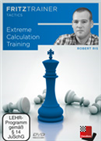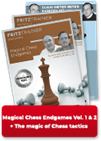Aronian, Ding and Artemiev also in semis
All the rating favourites won their quarterfinal matches at the Goldmoney Asian Rapid tournament — yes, Vladislav Artemiev is higher rated than Anish Giri in rapid. The semifinals will see world champion Magnus Carlsen facing Levon Aronian and Ding Liren playing Artemiev.
For Carlsen and Aronian, getting a ticket to semis was no easy task. While it was to be expected that Wesley So would pose a big challenge to the world champion, it was refreshing to see a new face making Aronian work extra hard to win the match, as 17-year-old Arjun Erigaisi could have easily beaten the Armenian in a very close confrontation.
 On this DVD a team of experts looks closely at the secrets of Karpov's games. In more than 7 hours of video, the authors examine four essential aspects of Karpov's superb play.
On this DVD a team of experts looks closely at the secrets of Karpov's games. In more than 7 hours of video, the authors examine four essential aspects of Karpov's superb play.Aronian told Kaja Snare:
It was very tough. I didn’t know him well, and he turned out to be a very difficult opponent and very motivated guy. I am happy to have gone through.
While Aronian had a tough time from the get go of the second set — he was on the back foot in the first three games — Carlsen seemed en route to get a clean victory over So. However, the American grandmaster scored back-to-back wins on demand to impressively come back from behind and force tiebreaks.
Carlsen was happy to advance to the semis:
I thought after the first two games today, this may be the one time that I will have a very clean performance. But it wasn’t to be. Overall I am happy to go through. I am not that upset with my losses. It wasn’t good, but happy to have pulled myself together.

Click to enlarge
Carlsen* 1½ - 2½ So
*Won the tiebreaker 1½-½
Both victories by So in the second set of the match were obtained thanks to his technical abilities in rook endgames. In game 4, Carlsen made the decisive mistake on move 55.
White is stuck defending a miserable position, but rook endgames are notorious for their drawing tendencies. At this point, the right way to wait was with 55.Ra7, while the world champion’s 55.Kg3 allowed Black to unleash his e-pawn after 55...Rg4+ 56.Kh3 e4. So needed fifteen more moves to convert his position into a victory.
GM Karsten Müller took a more in-depth look at the ending. Find his instructive analysis in the replayer below (game 4).
Select an entry from the list to switch between games
Aronian* 2 - 2 Arjun
*Won the tiebreaker 1½-½
As mentioned above, Arjun could have won the match in the rapid phase of the second set. The Indian was in the driver’s seat in the first three encounters of the day, so kudos should be given to Aronian for his resourcefulness in defence.
In game 3, Arjun, playing white, was a pawn up in the middlegame.
 Special attention will be paid to Intermediate Moves, Quiet Moves, Sacrifices on Empty Squares, Mating Patterns, Ignoring Opponents Threat, Calculation in Defence and Method of Comparison. Plus 50 interactive examples to test your knowledge.
Special attention will be paid to Intermediate Moves, Quiet Moves, Sacrifices on Empty Squares, Mating Patterns, Ignoring Opponents Threat, Calculation in Defence and Method of Comparison. Plus 50 interactive examples to test your knowledge.
Converting this position is no easy task, but the 17-year-old Indian could have posed more problems to his opponent had he gone for 35.Rd1 or 35.Rg4, planning to slowly improve his position.
The suggested rook moves would have prevented what happened after 35.Bd1, as Aronian quickly restored material balance with 35...Bxd4. The game would end in a 58-move draw.
After all four rapid games finished drawn — by no means for a lack of fighting spirit — the match was decided in the blitz tiebreakers. Aronian prevailed in game 1 and drew the second 5-minute encounter to knock out his young colleague.
Artemiev 2 - 1 Giri
For a second day in a row, a fourth game was not needed in this matchup. Artemiev had won all three games on Tuesday, and continued with his winning streak in the second set, as he obtained a fourth straight victory after his rival played an imprecision as early as move 11.
11.Qd3 allowed 11...b5 12.Bb3 Nc5 gaining the bishop pair in the next move. Giri tried to complicate matters, but to no avail. Artemiev’s sharp eye for the smallest of tactical resources gave him a 21-move victory, while draws in the following two games granted him a spot in the semifinals of the online event.
Ding 3 - 1 Duda
After drawing all four games in a hard-fought and entertaining first set, Ding and Duda played four decisive encounters on Wednesday. The Polish grandmaster kicked off with a win, but his Chinese colleague won the three remaining confrontations to secure match victory.
In game 3, Ding made good use of his passed pawns in an endgame.
 In over 4 hours in front of the camera, Karsten Müller presents to you sensations from the world of endgames - partly reaching far beyond standard techniques and rules of thumb - and rounds off with some cases of with own examples.
In over 4 hours in front of the camera, Karsten Müller presents to you sensations from the world of endgames - partly reaching far beyond standard techniques and rules of thumb - and rounds off with some cases of with own examples.
53...Kf7 was Duda’s losing mistake. White quickly activated his king and started pushing his pawns until forcing his opponent to resign.
GM Müller analysed the position and provided instructive annotations (game 3 in the interactive replayer below).
Links
























